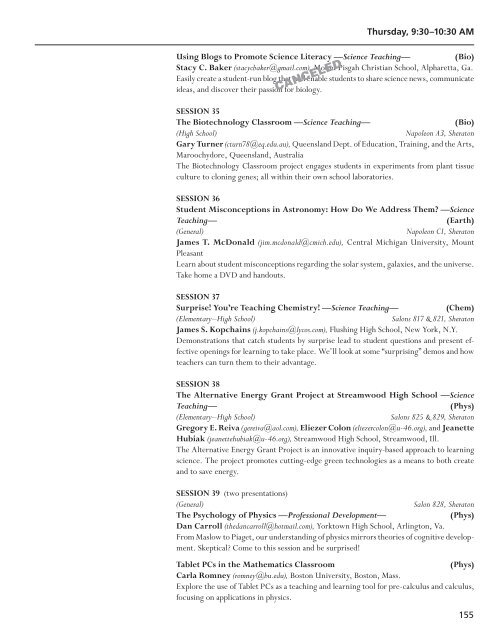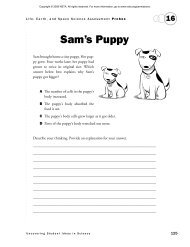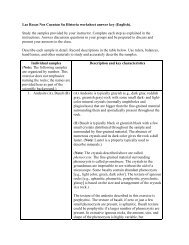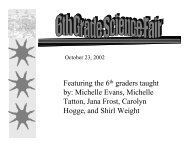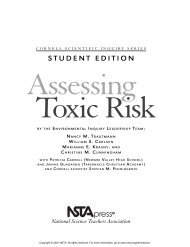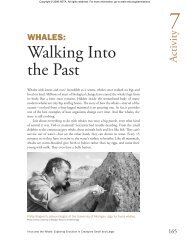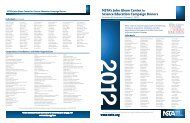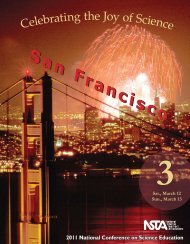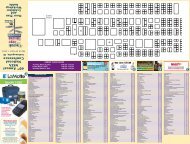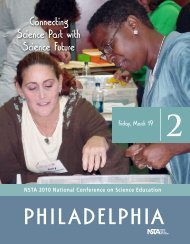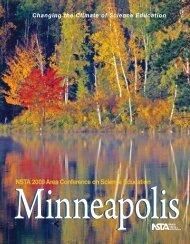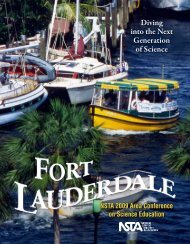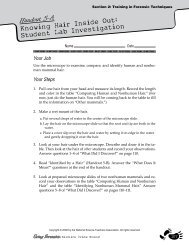New Orleans Program, Vol. 1 - National Science Teachers Association
New Orleans Program, Vol. 1 - National Science Teachers Association
New Orleans Program, Vol. 1 - National Science Teachers Association
You also want an ePaper? Increase the reach of your titles
YUMPU automatically turns print PDFs into web optimized ePapers that Google loves.
Using Blogs to Promote <strong>Science</strong> Literacy —<strong>Science</strong> Teaching— (Bio)<br />
Stacy C. Baker (stacycbaker@gmail.com), Mount Pisgah Christian School, Alpharetta, Ga.<br />
Easily create a student-run blog that will enable students to share science news, communicate<br />
ideas, and discover their passion for biology.<br />
CANCELED<br />
Thursday, 9:30–10:30 AM<br />
SESSION 35<br />
The Biotechnology Classroom —<strong>Science</strong> Teaching— (Bio)<br />
(High School) Napoleon A3, Sheraton<br />
Gary Turner (cturn78@eq.edu.au), Queensland Dept. of Education, Training, and the Arts,<br />
Maroochydore, Queensland, Australia<br />
The Biotechnology Classroom project engages students in experiments from plant tissue<br />
culture to cloning genes; all within their own school laboratories.<br />
SESSION 36<br />
Student Misconceptions in Astronomy: How Do We Address Them? —<strong>Science</strong><br />
Teaching— (Earth)<br />
(General) Napoleon C1, Sheraton<br />
James T. McDonald (jim.mcdonald@cmich.edu), Central Michigan University, Mount<br />
Pleasant<br />
Learn about student misconceptions regarding the solar system, galaxies, and the universe.<br />
Take home a DVD and handouts.<br />
SESSION 37<br />
Surprise! You’re Teaching Chemistry! —<strong>Science</strong> Teaching— (Chem)<br />
(Elementary–High School) Salons 817 & 821, Sheraton<br />
James S. Kopchains (j.kopchains@lycos.com), Flushing High School, <strong>New</strong> York, N.Y.<br />
Demonstrations that catch students by surprise lead to student questions and present effective<br />
openings for learning to take place. We’ll look at some “surprising” demos and how<br />
teachers can turn them to their advantage.<br />
SESSION 38<br />
The Alternative Energy Grant Project at Streamwood High School —<strong>Science</strong><br />
Teaching— (Phys)<br />
(Elementary–High School) Salons 825 & 829, Sheraton<br />
Gregory E. Reiva (gereiva@aol.com), Eliezer Colon (eliezercolon@u-46.org), and Jeanette<br />
Hubiak (jeanettehubiak@u-46.org), Streamwood High School, Streamwood, Ill.<br />
The Alternative Energy Grant Project is an innovative inquiry-based approach to learning<br />
science. The project promotes cutting-edge green technologies as a means to both create<br />
and to save energy.<br />
SESSION 39 (two presentations)<br />
(General) Salon 828, Sheraton<br />
The Psychology of Physics —Professional Development— (Phys)<br />
Dan Carroll (thedancarroll@hotmail.com), Yorktown High School, Arlington, Va.<br />
From Maslow to Piaget, our understanding of physics mirrors theories of cognitive development.<br />
Skeptical? Come to this session and be surprised!<br />
Tablet PCs in the Mathematics Classroom (Phys)<br />
Carla Romney (romney@bu.edu), Boston University, Boston, Mass.<br />
Explore the use of Tablet PCs as a teaching and learning tool for pre-calculus and calculus,<br />
focusing on applications in physics.<br />
155


